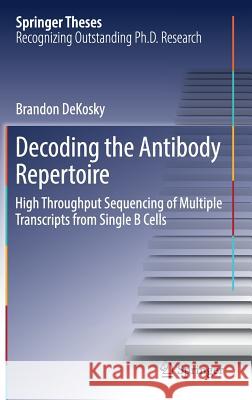Decoding the Antibody Repertoire: High Throughput Sequencing of Multiple Transcripts from Single B Cells » książka
topmenu
Decoding the Antibody Repertoire: High Throughput Sequencing of Multiple Transcripts from Single B Cells
ISBN-13: 9783319585178 / Angielski / Twarda / 2017 / 87 str.
Decoding the Antibody Repertoire: High Throughput Sequencing of Multiple Transcripts from Single B Cells
ISBN-13: 9783319585178 / Angielski / Twarda / 2017 / 87 str.
cena 402,53
(netto: 383,36 VAT: 5%)
Najniższa cena z 30 dni: 385,52
(netto: 383,36 VAT: 5%)
Najniższa cena z 30 dni: 385,52
Termin realizacji zamówienia:
ok. 22 dni roboczych
Dostawa w 2026 r.
ok. 22 dni roboczych
Dostawa w 2026 r.
Darmowa dostawa!
Kategorie BISAC:
Wydawca:
Springer
Seria wydawnicza:
Język:
Angielski
ISBN-13:
9783319585178
Rok wydania:
2017
Wydanie:
2017
Numer serii:
000416125
Ilość stron:
87
Waga:
0.34 kg
Wymiary:
23.5 x 15.5
Oprawa:
Twarda
Wolumenów:
01
Dodatkowe informacje:
Wydanie ilustrowane











